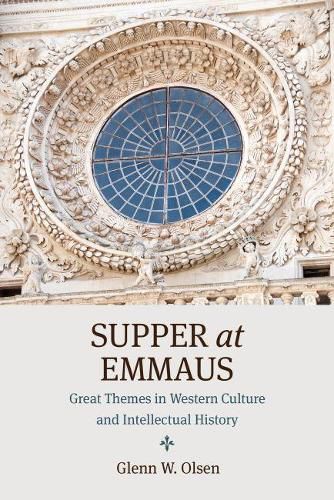Readings Newsletter
Become a Readings Member to make your shopping experience even easier.
Sign in or sign up for free!
You’re not far away from qualifying for FREE standard shipping within Australia
You’ve qualified for FREE standard shipping within Australia
The cart is loading…






Supper at Emmaus traces various important intellectual topics from the ancient world to the modern period. Generally, as in its treatment of the question of whether the long-standing contrast between cyclical and linear views of history is helpful, it introduces important thinkers who have considered the question. A preoccupation of the book is the appearance and reappearance across the centuries of patterns used to organize temporal and cultural experience. AYer an opening essay on transcendental truth and cultural relativism, the second chapter traces a distinction, common in historical writings during the past two centuries, between an alleged ancient classical cyclic view of time and history, used to describe the claimed repetitiveness of and similaritiesbetween historical events ( nothing is new under the sun ), and a contrasting Jewish-Christian linear view, sometimes described as providential in that it moves through a series of unique events to some end intended by God. In the latter, history is about something, the education of the human race or the redemption of humankind. As in each of the remaining essays, the book then attempts to draw out the limitations of what the current consensus on this topic has become. It does this for such things as our current understanding of religious toleration, humanism, natural law, and teleology. Some of the essays, such as those on debate about Augustine’s understanding of marriage or the concluding illustrated essay on the baroque city of Lecce, are published for the first time. Others are based on previously published contributions to the scholarly literature, though generally each of these chapters concludes with a postscript that engages with current scholarly debate on the subject.
$9.00 standard shipping within Australia
FREE standard shipping within Australia for orders over $100.00
Express & International shipping calculated at checkout
Supper at Emmaus traces various important intellectual topics from the ancient world to the modern period. Generally, as in its treatment of the question of whether the long-standing contrast between cyclical and linear views of history is helpful, it introduces important thinkers who have considered the question. A preoccupation of the book is the appearance and reappearance across the centuries of patterns used to organize temporal and cultural experience. AYer an opening essay on transcendental truth and cultural relativism, the second chapter traces a distinction, common in historical writings during the past two centuries, between an alleged ancient classical cyclic view of time and history, used to describe the claimed repetitiveness of and similaritiesbetween historical events ( nothing is new under the sun ), and a contrasting Jewish-Christian linear view, sometimes described as providential in that it moves through a series of unique events to some end intended by God. In the latter, history is about something, the education of the human race or the redemption of humankind. As in each of the remaining essays, the book then attempts to draw out the limitations of what the current consensus on this topic has become. It does this for such things as our current understanding of religious toleration, humanism, natural law, and teleology. Some of the essays, such as those on debate about Augustine’s understanding of marriage or the concluding illustrated essay on the baroque city of Lecce, are published for the first time. Others are based on previously published contributions to the scholarly literature, though generally each of these chapters concludes with a postscript that engages with current scholarly debate on the subject.